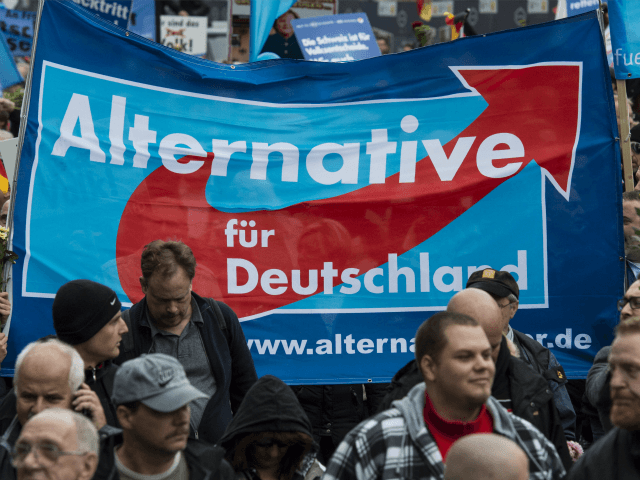Six-metre-high fences are a solution to stem a record influx of refugees to Germany, the co-president of populist party AfD tells a rapt audience at a campaign rally ahead of Sunday’s regional elections.
“Of course fences would help” stop more migrants from arriving, said Joerg Meuthen, emphasising his party’s position that is directly opposed to Chancellor Angela Merkel’s liberal refugee policy.
With misgiving growing in Germany over the 1.1 million asylum seekers who arrived in 2015 alone, the AfD is projected to scoop up protest votes during regional elections in three states on Sunday, potentially even becoming a third political force in some of these places.
More than 12 million voters are due to elect three new regional parliaments for the southwestern states of Baden-Wuerttemberg and Rhineland-Palatinate, as well as eastern Saxony-Anhalt.
At the rally in Friedrichshafen, a town with neat houses lining Lake Constance in affluent Baden-Wuerttemberg, Meuthen pointed to the Spanish enclaves of Melila and Ceuta as examples where six-metre high fences dissuade Africans from crossing into Europe.
“They have to go around the Mediterranean” to find a way in, Meuthen said: “Yes, fences have an impact”.
In front of about 300 people, many of them well-dressed and elderly, the 54-year-old economics professor wearing thin glasses and a grey suit and tie, argued that it is “not out of pleasure, but it’s necessary” for Germany to seal itself off because “we already have too many people here.”
“And we can’t and do not want to integrate everyone,” he said, as a female member of the audience cried out: “especially since they don’t want to integrate!”
Another speaker at the rally, Alice Weidel, who is AfD’s candidate for the Bodenseekreis district, made a reference to a spate of attacks on New Year’s Eve in Cologne, where a crowd of mostly North African men sexually assaulted or robbed hundreds of women.
“Oriental sexual tradition” was incompatible with European values and was what led to the attacks, she said in the room, where posters of the upstart party read: “Stop the asylum chaos!”.
– ‘Not real refugees’ –
AfD began life in 2013 as an anti-euro party, but has since morphed into one that sparked a storm in January after suggesting police may have to shoot at migrants at the borders.
But it has seen a stellar rise in its fortunes as growing numbers of Germans question if Merkel’s refusal to impose a cap on refugees was correct.
In Baden-Wuerttemberg — the traditional stronghold of Merkel’s Christian Democratic Union (CDU) — the AfD is forecast to garner 12.5 percent of support on the back of eroding backing for the German leader’s party.
If that proves accurate, it would become the third political force in the region that is also playing host to some of the biggest numbers of refugees in Germany.
Friedrichshafen is a typical town in the prosperous state, where unemployment has not risen above 3.4 percent in years, and where much of the Mittelstand — Germany’s economic backbone of small and medium-sized enterprises — is based.
Suspicions against migrants seeking a handout or welfare is therefore high among the population that prides itself on its industry and hard work.
As Meuthen claimed that “a large number” of new arrivals are not bona fide refugees, he was met with enthusiastic applause.
“We cannot accept economic migrants, he’s right,” said Ralf Schanne, who himself is of Romanian origin, clapping loudly.
“We are told this is a far-right party but this man is not a Nazi!”

COMMENTS
Please let us know if you're having issues with commenting.